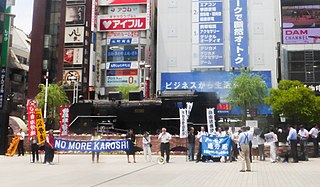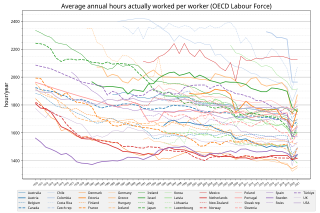Reduction of hours of work may refer to:

Karoshi, which can be translated into "overwork death", is a Japanese term relating to occupation-related sudden death.
Full-time equivalent (FTE), or whole time equivalent (WTE), is a unit of measurement that indicates the workload of an employed person in a way that makes workloads or class loads comparable across various contexts. FTE is often used to measure a worker's or student's involvement in a project, or to track cost reductions in an organization. An FTE of 1.0 is equivalent to a full-time worker or student, while an FTE of 0.5 signals half of a full work or school load.
The 35-hour workweek is a labour reform policy adopted in France in February 2000, under Prime Minister Lionel Jospin's Plural Left government. Promoted by Minister of Labour Martine Aubry, it was adopted in two phases: the Aubry 1 law in June 1998 and the Aubry 2 law in January 2000. The previous legal working week was 39 hours, established by President François Mitterrand, also a member of the Socialist Party. The 35-hour working week had been on the Socialist Party's 1981 electoral program, titled 110 Propositions for France, but was not pursued because of the poor state of the economy.

Working (laboring) time is the period of time that a person spends at paid labor. Unpaid labor such as personal housework or caring for children or pets is not considered part of the working week.
Flextime is a flexible hours schedule that allows workers to alter their workday and decide/adjust their start and finish times. In contrast to traditional work arrangements that require employees to work a standard 9 a.m. to 5 p.m. day, flextime typically involves a "core" period of the day during which employees are required to be at work, and a "bandwidth" period within which all required hours must be worked. The working day outside of the "core" period is "flexible time", in which employees can choose when they work, subject to achieving total daily, weekly or monthly hours within the "bandwidth" period set by employers, and subject to the necessary work being done. The total working time required of employees on flextime schedules is the same as that required under traditional work schedules.
In the United Kingdom, junior doctors are qualified medical practitioners working whilst engaged in postgraduate training. The period of being a junior doctor starts when they qualify as a medical practitioner following graduation with a Bachelor of Medicine, Bachelor of Surgery degree and start the UK Foundation Programme. It culminates in a post as a consultant, a general practitioner (GP), or some other non-training post, such as a specialty doctor or associate specialist post.

A part-time job is a form of employment that carries fewer hours per week than a full-time job. They work in shifts. The shifts are often rotational. Workers are considered to be part-time if they commonly work fewer than 30 hours per week. According to the International Labour Organization, the number of part-time workers has increased from one-quarter to a half in the past 20 years in most developed countries, excluding the United States. There are many reasons for working part-time, including the desire to do so, having one's hours cut back by an employer and being unable to find a full-time job. The International Labour Organisation Convention 175 requires that part-time workers be treated no less favourably than full-time workers.
A full-time job is employment in which workers work a minimum number of hours defined as such by their employer.
The Federal Employees' Retirement System (FERS) is the retirement system for employees within the United States civil service. FERS became effective January 1, 1987, to replace the Civil Service Retirement System (CSRS) and to conform federal retirement plans in line with those in the private sector.
The weekdays and weekend are the complementary parts of the week devoted to labour and rest, respectively. The legal weekdays, or workweek, is the part of the seven-day week devoted to working. In most of the world, the workweek is from Monday to Friday and the weekend is Saturday and Sunday. A weekday or workday is any day of the working week. Other institutions often follow this pattern, such as places of education. The constituted weekend has varying definitions, based on determined calendar days, designated period of time, and/or regional definition of the working week. Sometimes the term "weekend" is expanded to include the time after work hours on the last workday of the week.
The eight-hour day was a social movement to regulate the length of a working day, preventing excesses and abuses of working time.
A furlough is a temporary cessation of paid employment that is intended to address the special needs of a company or employer; these needs may be due to economic conditions that affect a specific employer, or to those prevailing in society as a whole. Furloughs may be short- or long-term.
Annual leave is a period of paid time off work granted by employers to employees to be used for whatever the employee wishes. Depending on the employer's policies, differing number of days may be offered, and the employee may be required to give a certain amount of advance notice, may have to coordinate with the employer to be sure that staffing is available during the employee's absence, and other requirements may have to be met. The vast majority of countries today mandate a minimum amount of paid annual leave by law.
Sick leave is paid time off from work that workers can use to stay home to address their health needs without losing pay. It differs from paid vacation time or time off work to deal with personal matters, because sick leave is intended for health-related purposes. Sick leave can include a mental health day and taking time away from work to go to a scheduled doctor's appointment. Some policies also allow paid sick time to be used to care for sick family members, or to address health and safety needs related to domestic violence or sexual assault. Menstrual leave is another type of time off work for a health-related reason, but it is not always paid.
A four-day workweek is an arrangement where a workplace or place of education has its employees or students work or attend school, college or university over the course of four days per week rather than the more customary five. This arrangement can be a part of flexible working hours, and is sometimes used to cut costs.

The Working Time Regulations 1998 is a statutory instrument in UK labour law which implements the EU Working Time Directive 2003. It does not extend to Northern Ireland.
Work–life balance in the United States is having enough time for work and enough time to have a personal life in the United States. Related, though broader, terms include lifestyle balance and life balance. The most important thing in work and life is the personal ability to demonstrate and meet the needs of work and personal life in order to achieve goals. People should learn to deal with role engagement management, role conflict management and managing life needs to achieve balance. Balance is about how to properly achieve the desired work and life satisfaction and needs in a conflict situation.
Legislation relating to employment in the Republic of Ireland governs the provision and content of the contract of employment, payment of wages, length of the working day and working week, and dismissal procedures.

South Korea has been a society that could not guarantee work–life balance historically and legally. But work–life balance in South Korea advanced when Warabel emerged as a neologism, changing the perception of people's work and their basic rights. There are two major movements: improving law and improving people's perceptions.
The six-hour day is a schedule by which the employees or other members of an institution spend six hours contributing. This is in contrast to the widespread eight-hour day, or any other time arrangement. It has also been proposed as a better alternative to the four-day week, another proposed way to reduce working time.